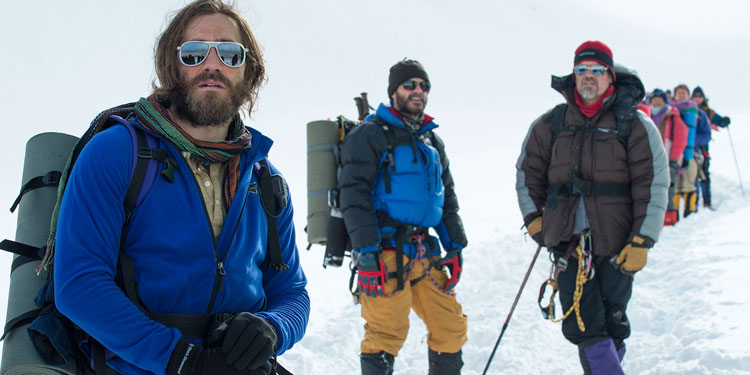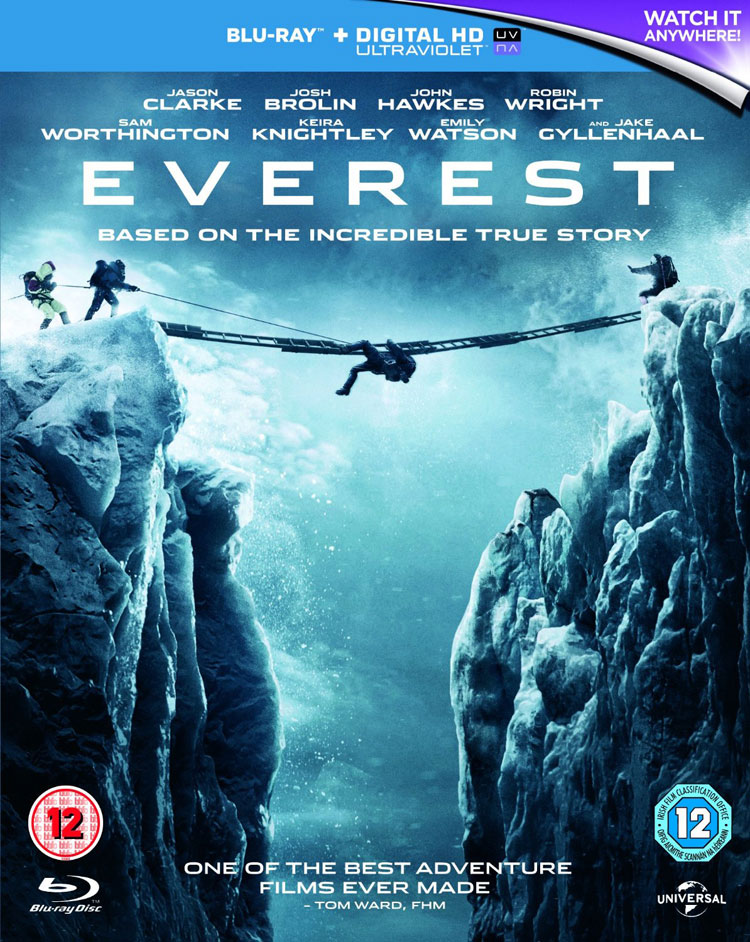
Director: Baltasar Kormakur
Running Time: 121 mins
Certificate: 12
Release Date: January 18th 2016 (UK)

It’s climbing season in the Himalayas and Rob Hall (Jason Clarke) is planning to lead a group of adventure tourists to the summit of Mount Everest. While he keeps telling them how dangerous it is and how many people physically cannot make it, many are gung-ho to get to the top. As they make their way higher up the mountain, Rob decides it’s going to be best to team up with a rival company, led by Scott Fischer (Jake Gyllenhaal), in the hope of keeping things as safe as possible.
After facing illness and other issues that prevent some of them getting to the top, a group of them make it, only to be hit by an extremely nasty storm, which threatens to ensure that none of them will make it back down again. As the team gets separated and faces ever greater threat, it becomes increasingly clear that not everyone is going to make it back alive.
Everest is not a subtle movie. Indeed, it seems to have taken its cues from Second World War movies in terms of how to get you to empathise with the characters, from the guy who while on the mountain talks about his pregnant wife, to the person who’s so arrogant that you know his only hope isn’t his skill as a climber but learning a bit of humility. Throw in the woman who’s already climbed six of the seven highest mountains and just needs the biggest, and a man on his final chance to conquer the mountain, and you’ve got character shorthand 101.
Story-wise it’s not very complex either – they go up the mountain (complete with lots of ominous foreshadowing), it all goes wrong, and we have to wait to see who’s going to make it back down. It’s a little odd really as the two credited screenwriters, Simon Beaufoy (Slumdog Millionaire) and William Monahan (Mandela: Long Walk To Freedom) are both known for writing smart scripts with complex characters, but here it feels they’ve felt hamstrung by a sense of responsibility to the real people they’re depicting.
The movie is based on a true story, but nobody 100% knows what happened in May 1996 to those who didn’t survive during what was the greatest disaster ever to befall Everest until the 2015 Nepal Earthquake. The movie understandably feels beholden to being fair to them and not making any of them look bad. But that, mixed with the fact that many of its character shorthand are based on the truth (at least in simple form), results in something that story-wise feels a little too bare-bones and isn’t as powerful as it might have been. That said, it’s worth watching the featurette about the true story, as it shows how much of the story is true, even if it’s handled in less than subtle ways.
I did wonder whether it was because it knows its story is pretty simple that it got a very good cast together, with Clarke and Gyllenhaal joined by the likes of Josh Brolin, Robin Wright, Keira Knightley, John Hawkes, Martin Henderson, Sam Worthington, Emily Watson and Michael Kelly.
Thankfully though, the film does have a massive saving grace – the mountain and the way that it’s filmed. Indeed, it’s this that the makers have invested as the complicated character of the piece. Director Baltasar Kormakur really put in huge amounts of effort to show the majesty, danger, beauty, terror and scale of the mountain, using the camera in an incredibly fluid way to get that across.
It’s an incredible looking movie and some of the action sequences are incredibly well put together, which is very noticeable on the Blu-ray. However, what’s also clear is that without the astonishing, dizzying 3D of the cinema – the shortcomings in Everest’s plot and script are more apparent (although if you watch it in Blu-ray 3D, that’s going to be less of an issue). It’s certainly not a bad watch, and some of it is beautiful, exciting and extremely well made technically. The Blu-ray also features some pretty good featurettes, focussing on the true story, the amount of the movie that was made on location in Nepal, and also the technical challenges of recreating the summit of Everest and the extreme conditions faced by the climbers in the studio. It’s just a shame the story couldn’t have offered a bit more.
Overall Verdict: Despite how much of it is based on the truth, the way the scripts handle it make the story feel a little clichéd and less powerful than it might have been. However, when the film purely takes its cues from the mountain it improves massively and is occasionally quite breath-taking.
Reviewer: Tim Isaac
Leave a Reply (if comment does not appear immediately, it may have been held for moderation)